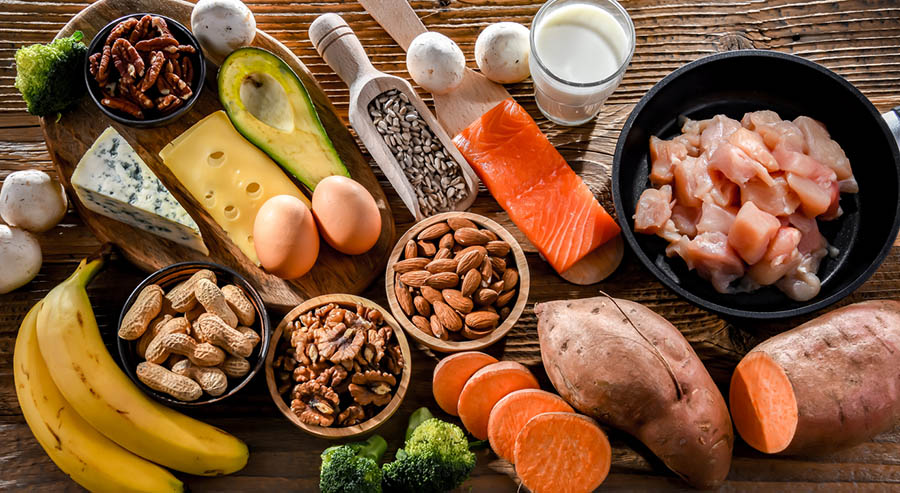
Just like any other organ in our body, the brain requires proper nourishment to function at its best.
Most experts talk about various foods they believe beneficial to brain health. Let’s take a look at the other side of the coin… representing the nutrients the brain actually needs in order to perform at an optimal level.
In this article, we will explore the essential nutrients, both macronutrients and micronutrients, that play a crucial role in maintaining brain health and supporting optimal cognitive performance.
Macronutrients for a Healthy Brain
Protein
Protein is made up of amino acids that are the building blocks of neurotransmitters, the chemical messengers responsible for communication between brain cells.
Including lean meats, poultry, fish, eggs, dairy products, legumes, and plant-based proteins like tofu and quinoa in your diet can provide the necessary protein for brain health. (Reference: Dell’Osso et al., 2016).
Healthy Fats
Healthy fats, such as monounsaturated fats and polyunsaturated fats, are essential for brain function. They provide structure to brain cell membranes and support the flow of nutrients and signals through the brain.
Sources of healthy fats include fatty fish (salmon, trout, sardines), avocados, nuts (walnuts, almonds), seeds (flaxseeds, chia seeds), and olive oil. (Reference: Gómez-Pinilla, 2008).
Complex Carbohydrates
Carbohydrates are the brain’s primary source of energy. Opt for complex carbohydrates like whole grains (brown rice, quinoa, whole wheat), fruits, and vegetables, as they provide a steady release of glucose, the brain’s preferred fuel.
Avoid refined sugars and processed carbohydrates that can disrupt blood sugar levels and impair cognitive function. (Reference: Mangialasche et al., 2013).
Micronutrients for a Healthy Brain
Vitamin B Complex
B vitamins, including B6, B12, and folate, are essential for brain health. They participate in the production and regulation of neurotransmitters and contribute to the overall functioning of the nervous system.
Good sources of B vitamins include whole grains, leafy greens, legumes, eggs, lean meats, and dairy products. (Reference: Kennedy et al., 2016).
Omega-3 Fatty Acids
Omega-3 fatty acids, particularly EPA and DHA, are essential for brain health and cognitive function. They support the structure and integrity of brain cells and are involved in neurotransmitter synthesis.
Incorporate fatty fish (salmon, trout), flaxseeds, chia seeds, and walnuts into your diet to ensure an adequate intake of omega-3 fatty acids. (Reference: Yurko-Mauro et al., 2015).
Antioxidants
Omega-3 fatty acids, particularly EPA and DHA, are essential for brain health and cognitive function. They support the structure and integrity of brain cells and are involved in neurotransmitter synthesis.
Incorporate fatty fish (salmon, trout), flaxseeds, chia seeds, and walnuts into your diet to ensure an adequate intake of omega-3 fatty acids. (Reference: Yurko-Mauro et al., 2015).
Antioxidants protect brain cells from oxidative stress and inflammation caused by free radicals.
Include antioxidant-rich foods like berries (blueberries, strawberries), dark chocolate, green leafy vegetables (spinach, kale), and colorful fruits (citrus fruits, grapes) in your diet to support brain health. (Reference: Joseph et al., 2009).
Vitamin E
Vitamin E is a powerful antioxidant that protects brain cells from oxidative damage. It also supports the overall health of blood vessels, including those in the brain.
Sources of vitamin E include nuts (almonds, walnuts), seeds (sunflower seeds, pumpkin seeds), spinach, and avocados. (Reference: Morris et al., 2002).
Conclusion
To optimize brain health and cognitive performance, it is crucial to provide the brain with a balanced combination of macronutrients and essential micronutrients.
Consuming a diet rich in lean proteins, healthy fats, complex carbohydrates, and nutrient-dense fruits and vegetables will ensure that your brain receives the necessary fuel and building blocks for optimal functioning.
Remember to consult with a healthcare professional or registered dietitian for personalized advice tailored to your specific dietary needs.
References
Dell’Osso, B., Benedetti, F., M. B., & C. G. (2016). Nutritional Aspects of Psychiatry. Advances in Experimental Medicine and Biology, 905, 135-148.
Gómez-Pinilla, F. (2008). Brain foods: the effects of nutrients on brain function. Nature Reviews Neuroscience, 9(7), 568-578.
Kennedy, D. O., Dodd, F. L., Robertson, B. C., & Okello, E. J. (2016). Dose-dependent cognitive effects of acute cocoa flavanol intake on attentional tasks in humans. The Journal of Nutrition, 146(4), 871S-876S.
Mangialasche, F., Kivipelto, M., Mecocci, P., Rizzuto, D., Palmer, K., & Winblad, B. (2013). High adherence to a Mediterranean diet, cognitive decline, and risk of dementia. JAMA Internal Medicine, 173(11), 1682-1689.
Morris, M. C., Evans, D. A., Tangney, C. C., Bienias, J. L., Wilson, R. S., & Aggarwal, N. (2002). Dietary fats and the risk of incident Alzheimer disease. Archives of Neurology, 60(2), 194-200.
Joseph, J. A., Shukitt-Hale, B., & Willis, L. M. (2009). Grape juice, berries, and walnuts affect brain aging and behavior. The Journals of Gerontology Series A: Biological Sciences and Medical Sciences, 64A(8), 859-864.
Yurko-Mauro, K., McCarthy, D., Rom, D., Nelson, E. B., Ryan, A. S., Blackwell, A., … & Midttun, Ø. (2015). Beneficial effects of docosahexaenoic acid on cognition in age-related cognitive decline. Alzheimer’s & Dementia: The Journal of the Alzheimer’s Association, 11(6), 642-651.
